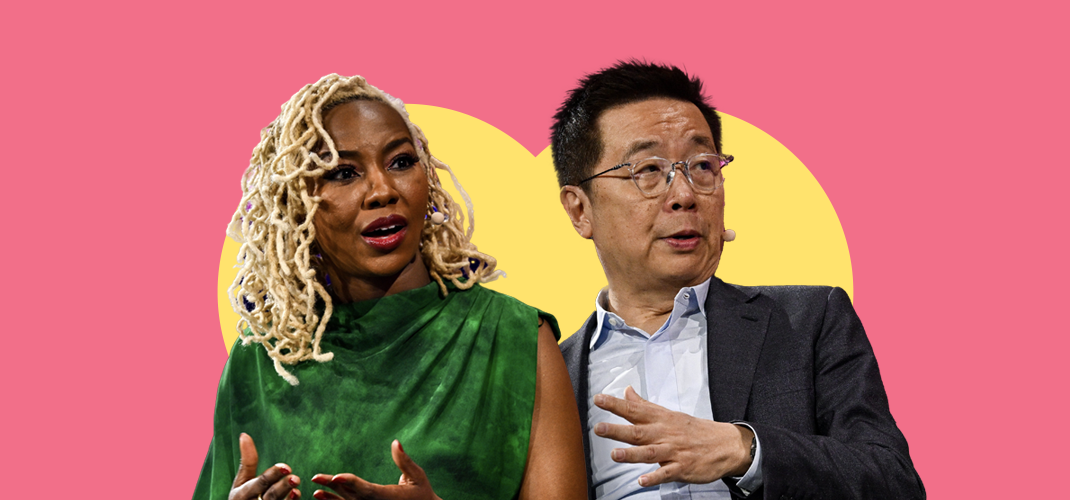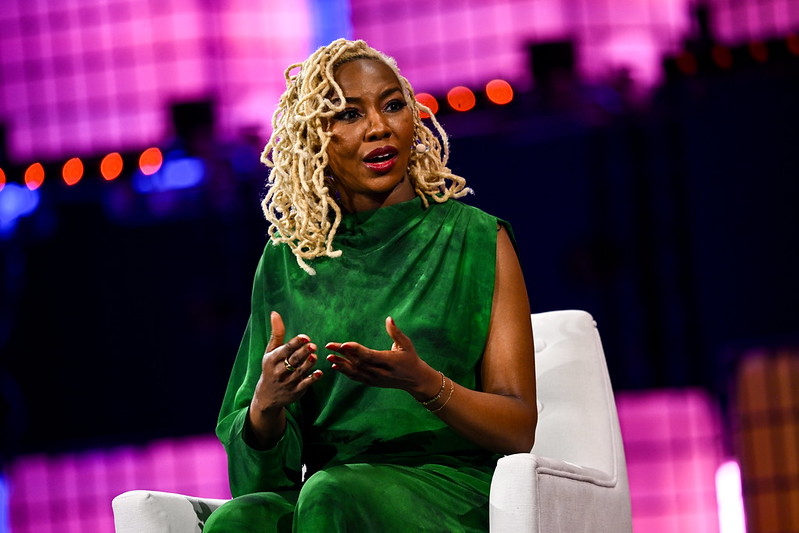
Here’s what you missed on Day 2 of Web Summit Qatar

From technology’s effect on social activism to the trials and tribulations of content creation, here are just some of the highlights from Day 2.
Day 2 of Web Summit Qatar was all about artificial intelligence, with talks ranging from the tech’s effect on social movements to how experts foresee it determining the future of marketing.
Here are some of the highlights from the second day of our inaugural event in the Middle East.
Why spend US$7 trillion when US$70 billion will do?
OpenAI CEO Sam Altman is seeking US$7 trillion to overhaul the global semiconductor industry – an amount that would put Sam at the head of one of the planet’s top economies.
The aim? To dominate the chip world. The problem? The CEO’s valuations are all wrong. At least that’s what it seems. “We could do it, probably, in US$700 billion, which is a bargain,” said Jonathan Ross, founder and CEO of Groq.
Groq bills itself as the world’s first language processing unit (LPU), providing eye-catching speed performance for AI workloads running on the company’s LPU inference engine. “Our next-gen chip is 10-times more efficient than this generation, so maybe only US$70 billion,” said Jonathan.
“Originally, we didn’t know that generative AI was going to be that important. The term didn’t really exist,” said the former Google employee, bringing us back to the 2017 face-off between Google’s AlphaGo and world-champion Go player Lee Sedol.
From victory there, using chips Jonathan had built, GenAI was born. It lay relatively dormant until last year, when large language models burst onto the scene, giving concepts such as AlphaGo a boost of speed. And now, we’re in a world where GenAI-backed developments are arriving at breakneck speed.
Tech and the quest for justice
 Creative entrepreneur, tech advisor and Black Lives Matter co-founder Ayọ Tometi speaking on Centre Stage at Web Summit Qatar. Image: Ramsey Cardy/Web Summit (CC BY 2.0)
Creative entrepreneur, tech advisor and Black Lives Matter co-founder Ayọ Tometi speaking on Centre Stage at Web Summit Qatar. Image: Ramsey Cardy/Web Summit (CC BY 2.0)As technology constantly evolves, the potential for social and political change broadens. But, rather than take a cynical approach, humanity should look to the potential these advancements pose for activism.
So says award-winning human rights activist and Black Lives Matter co-founder Ayọ Tometi, who believes technology goes hand-in-hand with human rights advocacy.
“Communications technology has always been important for human rights advocates. No matter what time period we’re in, we’re always making use of the tech or the communications of our day,” said Ayọ.
Reflecting on the strategies of late political activists including Martin Luther King Jr, Bayard Rustin and Coretta Scott King, Ayọ highlighted the importance of the press in social movements: “They were always mobilising and organising themselves in a way that they could garner press in order to share their stories with a broader public. And they were so incredibly effective, because at the end of the day, we are human beings. People understand stories, and when they see what is happening, they’re moved by it.”
Though Ayọ touched on the potential dangers of technology – including public access to personal data and the spread of misinformation – she stressed the value it provides on a global scale.
“What we’re doing now is using our cell phones … and we’re able to document and share our stories, raise funds, and raise awareness for movements,” she added.
For content creators, AI is a double-edged sword
Rather than shying away from AI, busy creators are embracing generative tools to expand their offerings and break into new markets. But, will it also lead to their demise?
TikTok influencer Michael Le was quick to highlight tapping into OpenAI’s Sora to quickly and inexpensively generate video from text, and making use of HitMeUp.ai to automate fan interactions.
“There are a lot of tools that you can pay attention to [in order] to help facilitate the busy work, not necessarily the creative,” noted the influencer, who uses an AI tool to keep track of trending songs to incorporate into dance TikToks.
“For me, it’s a blend between AI and actual manual work,” added YouTuber Eric Struk, whose niche is reviewing airlines around the world.
“Because about 50 percent of my YouTube videos are actually just voiceover narration, with Eleven Labs you could actually replicate your voice perfectly [in any language], and just type in what you want to say,” said Eric.
Another important aspect of gaining YouTube clicks is having the perfect thumbnail for your video. Eric has been using Spotter Labs, a GenAI tool that creates thumbnails based on text prompts.
You name it, and there’s an AI tool for the creator space. But with all these tools and no end to churning out content, is the creator market getting a little too crowded?
“When I first started TikTok back in 2018, you could post pretty much anything … and you could get a ton of views. But now, people are a little bit more in the loop,” admitted Eric.
The YouTuber says it’s not necessarily a zero-sum game, but that creators are having to try harder and make better quality content than ever before. Veteran TikToker Michael had an admission to make, though: “If I came in now versus back then, I wouldn’t have gotten the same results.”
Why storytelling is a marketing superpower
Crafting a compelling narrative is key to gaining a loyal customer base and keeping consumers engaged. But does access to user data and consumer habits hinder or amplify storytelling?
According to Amy Peck, founder and CEO of EndeavorXR, “marketing and advertising as industries have gone down a rabbit hole of harvesting data and then trying to tell stories to elicit behaviour for financial gain”.
And this is precisely where companies are going wrong, Amy alleged: “We’re all in the business, and we all want to make money. But having something that is a little more authentic – where the brands connect with their audience and move it on from there – that is the best case scenario.”
Click Ink Media president and CEO Aya Atassi agreed, saying that knowing your audience – not just having access to data or using specific algorithms – is the foundation of success for brands.
“What I advise my clients to do, and what I tell everyone, is to do your research on what the target audience is for each app,” said Aya. “So if you’re trying to target a younger audience, you want to be using TikTok and Instagram, whereas if you’re trying to target a bigger, more professional audience, you want to use LinkedIn or Facebook.”
When asked about how brands can maintain authenticity with the introduction of AI, and how it will affect storytelling, Amy expressed a belief that technology – when used as a supplementary tool rather than a primary one – will only augment brand narratives.
“I use it for brainstorming … and I let the AI just help me spark those creative juices … So learn just a little bit and start thinking of it as a tool, and find ways to use it in your day-to-day life. And then, as you build fluency, you’ll come up with better and better ideas; ways to be more creative with it as your sidekick,” Amy said.
‘You can’t give it all to Microsoft’
 Race Capital co-founder and general partner Alfred Chuang on stage at Web Summit Qatar 2024. Image: Ramsey Cardy/Web Summit (CC BY 2.0)
Race Capital co-founder and general partner Alfred Chuang on stage at Web Summit Qatar 2024. Image: Ramsey Cardy/Web Summit (CC BY 2.0)What will follow Microsoft’s historic domination of enterprise solutions? More domination from Microsoft. That’s according to Alfred Chuang, co-founder and general partner at Race Capital.
Likening the current investment cycle to something akin to the web boom two decades ago, Alfred thinks the push towards AI – which has witnessed investment figures bounce back following the fallow 2022-2023 years – is showing a handful of clear focuses of attention.
One is the clear attraction to “foundational technology”, as Alfred described it, highlighted by large language model companies spending significant sums on buying up opportunities in the space. Another is a focus on enterprise technology investment – “not consumer technology, because it is unknown how it will play out,” said the founder.
Within this, though, sits Microsoft: the dominant force of previous tech cycles, and the business best placed to run the show again.
“Given that, the world needs an alternative. You can’t give it all to Microsoft,” said Alfred. “So there is a lot of excitement around building out this enterprise infrastructure stack for GenAI in enterprise applications.”
This is what’s driving the congregation of companies in this field, said Alfred. Some are built for this space, others are pivoting in, while more and more are new companies, starting out there. “A lot of money is getting behind these companies.”
Don’t miss out on Web Summit Qatar 2025. Get your tickets now.
Main image of entrepreneur, tech advisor and Black Lives Matter co-founder Ayọ Tometi and Race Capital co-founder and general partner Alfred Chuang: Ramsey Cardy/Web Summit (CC BY 2.0)

